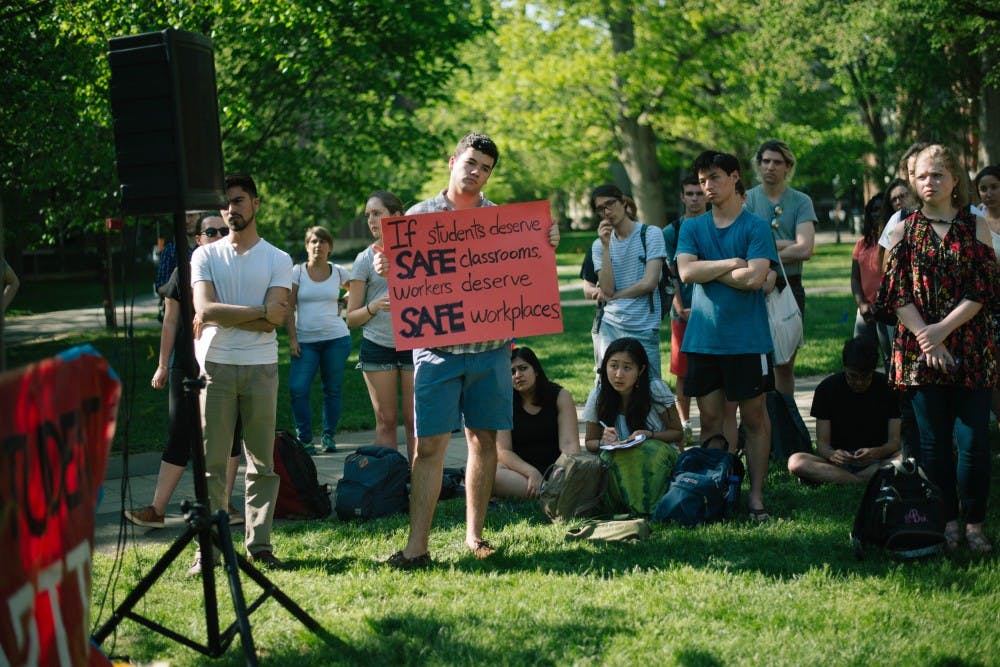On June 20, students from Princeton Young Democratic Socialists delivered a signed petition addressing concerns and grievances from campus workers in advance of upcoming union contract renegotiations. YDS created the petition using a grievance report they compiled after interviewing over thirty workers in Dining Services, Facilities, and other departments.
YDS circulated the petition following a Town Hall on May 9, 2018, during which grievances were brought to public attention. The petition highlights ongoing problems with wages and benefits, managerial harassment, hiring practices, and more. YDS worked closely with the Service Employees International Union Local 175 to produce the petition document. At the time of delivery, the petition had over 600 signatures.

Courtesy of Janette Lu.
Directed at President Christopher L. Eisgruber ’83, the Board of Trustees, and the Provost’s Office, the petition aims to impact this summer’s union renegotiations, which have been ongoing for the past month and will continue until a settlement is reached, according to SEIU 175 President Tommy Parker.
YDS members hope that the petition will help apply more pressure to the University leading up to contract renegotiations.
“I think it will be something that will pressure the University into doing what, very plainly, in my view, is the right thing,” YDS member Nicky Steidel ’18 said. “Just the presence of people’s concern and attention will put pressure on the University.”

The last time students organized formally in support of workers’ rights was in 2003, with the Workers’ Rights Organizing Committee. In the past 15 years, there has been a lack of conversation about such issues, according to YDS member Téa Wimer ’19, causing some important problems to go “under the radar.”
For example, contract negotiations in 2003 stated that the University would reduce its hiring of temporary workers, a practice that has since continued at a steady rate, Wimer said. Wimer believes that part of the reason is lack of student pressure on the University to hold up that promise.
When students have gotten involved, they’ve been able to make a considerable impact on workers’ rights.
“The last time WROC was involved, it did directly impact negotiations. We were able to get a Cost of Living Adjustment, which is something that we will put on the table,” SEIU 175 Local Vice President Richard Wilder said. “We certainly appreciate the students’ support.”

Parker hopes that the University will recognize the students’ rights to speak out and will address workers’ concerns. Although he acknowledged the difficulty of assessing the petition’s potential impact on negotiations, he appreciates message of community that the petition sends.
“We appreciate the students’ concerns and support. Hopefully, they continue to speak their minds,” Parker said.
Contract renegotiations take place every five years, with wages renegotiated in the final two years of that period. The contract covers most work-related issues and regulations in line with University policy, according to Wilder.
Key issues covered in the petition include cost of living adjustments to wages, managerial favoritism in performance reviews, resistance to medical or sick leave, continued hiring of temporary workers, and lack of education surrounding workers’ rights.
The petition also discussed inadequate living conditions for essential workers staying on campus during extreme weather. Employees working during snowstorms on February 19 and March 14, 2017, were packed overnight into the Frist Campus Center or Dillon Gymnasium, where they faced crowding and lack of privacy. In response, YDS organized a march in spring of 2017 to demand better housing and protest “wage theft” of overtime pay.
For Wimer, the petition goes beyond simply listing workers’ grievances. It’s also a conceptual push to show the University that students are paying attention, Wimer said.
“Students have always been an important voice. Students have always been the pushers of change on campus,” Wimer said.
The petition also gives a voice to workers who might feel silenced or ignored.
“Many workers at Princeton have expressed that they feel as if they don’t have a voice in their workplace. Multiple workers even reported that they were told they should not speak to students, which is unacceptable,” YDS member Aparna Raghu ’18, wrote in an email response.
Many students feel that more needs to be done for real and lasting change.
“Showing solidarity is an important start, but it will take actual changes to the contract, including increases in wages and improved protections for workers against discrimination and retaliation, to truly improve conditions for campus workers,” Raghu wrote.
In response to a request for comment, Assistant Vice President for Communications Daniel Day provided a written statement to the ‘Prince’ stating that the University appreciates the interest in the SEIU workers but does not believe it would be appropriate for the University to address these issues publicly with upcoming negotiations.
Both union and YDS members expressed a desire to maintain collaboration in the future, for the benefit of both workers and students.
“This can continue beyond the contract renegotiations. There are always ways to support workers, and to show public, vocal support,” Wimer said.
“Hopefully we can keep this relationship of students supporting the workers alive. The longer we stick around, the more likely it is that we’ll be heard,” Wilder said.








